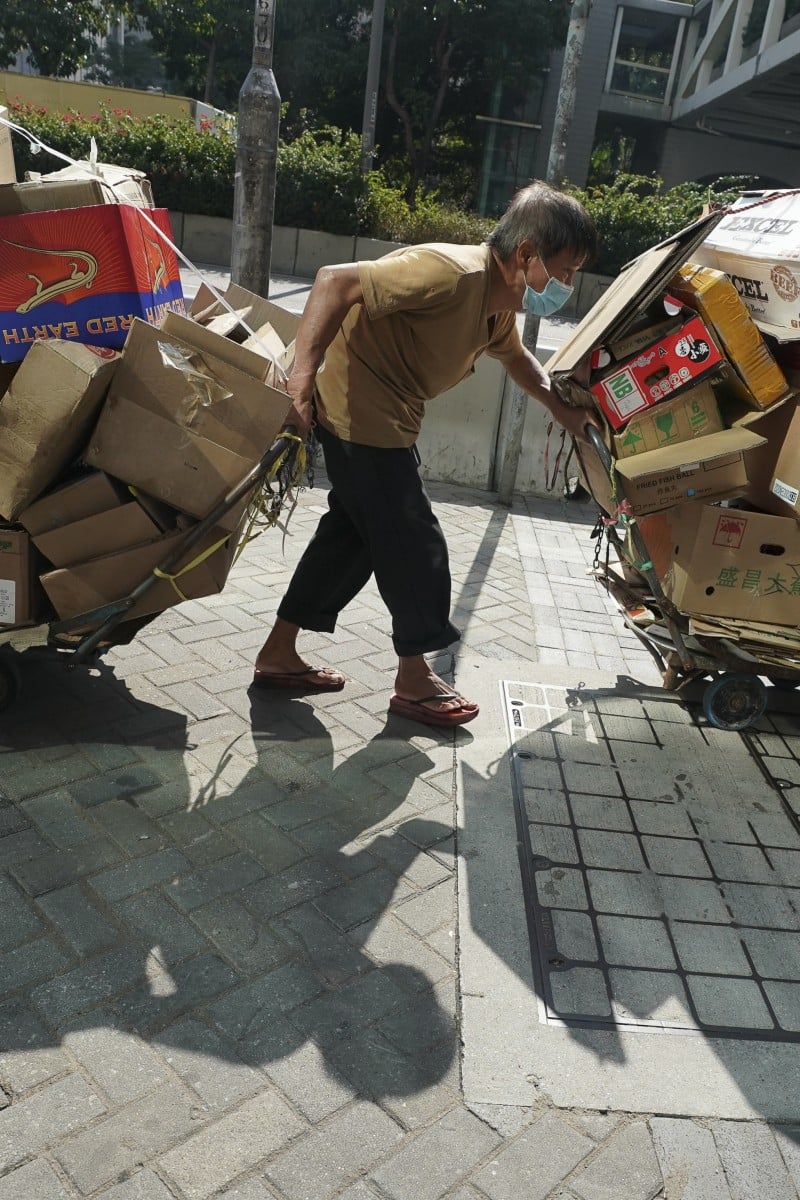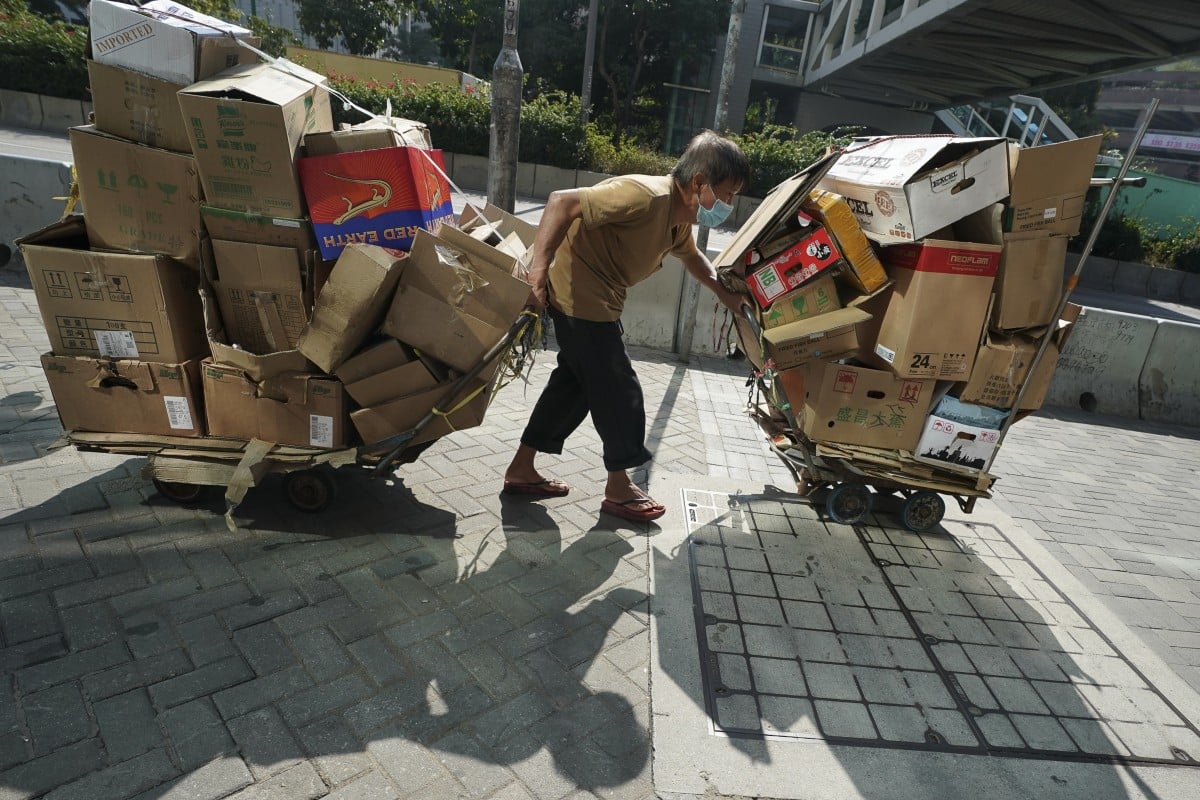
- Waste Picker Platform administrator explains how these informal workers are ‘crucial’ to city’s sustainability and why they need labour rights
- Every week, Talking Points gives you a worksheet to practise your reading comprehension with exercises about the story we’ve written
 According to Waste Picker Concern Group’s report, Hong Kong has up to 3,456 scavengers who collect approximately 159.25 tonnes of recycling waste every day. Photo: Felix Wong
According to Waste Picker Concern Group’s report, Hong Kong has up to 3,456 scavengers who collect approximately 159.25 tonnes of recycling waste every day. Photo: Felix WongPushing a metal cart, a 72-year-old waste picker surnamed Poon scavenges around her neighbourhood in the North District, gathering cardboard and polystyrene boxes from wet markets and restaurants to sell to recycling companies.
The Hongkonger’s back-breaking work usually stretches from 7am to 8pm, seven days a week, earning her a daily income of less than HK$100.
“I have no breaks in between [my work], and I need to work all day to eke out a living,” Poon said.
Since she started scavenging in 2000, not only has this work supplemented her monthly old age allowance of HK$1,620, but it is also her way of contributing to the environment and incorporating exercise into her day.
However, her hard work is not always appreciated, as she described facing unfriendly treatment from the public and accusations by authorities that she is illegally occupying public roads.
Hong Kong cleaners confused, overwhelmed by waste-charging scheme
“People discriminate against me using derogatory comments such as [calling me] ‘smelly’ ... Some people even steal my things, and my trolley has been confiscated by officials. It’s disheartening,” the elderly said as tears streamed down her face.
The coming launch of the municipal solid waste-charging scheme – though officials have hinted that it may be postponed again – poses a new challenge for waste pickers like Poon.
The Environmental Protection Department has yet to clarify if waste pickers will need to purchase designated garbage bags for rubbish they cannot recycle in order to avoid a HK$1,500 fine. The department said it is collecting opinions on the scheme and will review it on May 27.
Poon shared: “I have no idea about the scheme ... I will go with the flow and see how things unfold. If the expenses become too high, I may consider quitting.”
How scavengers contribute to city’s recycling
Hong Kong has about 3,456 scavengers who collect approximately 159.25 tonnes of recycling waste daily, according to a report published last month by the Waste Picker Concern Group.
The report, conducted last November, surveyed 95 recycling stores and 914 waste pickers to understand scavengers’ working conditions and livelihoods.
More than 70 per cent of waste pickers polled were aged between 60 and 79, and 80 per cent were women. About 40 per cent of respondents reported earning less than HK$500 per month from recycling.
“They play a crucial role in the city’s recycling industry, yet their pay is the lowest,” said Michael Chan Ka-ho, ministry administrator of an organisation within the concern group, the Waste Picker Platform under the Mission to New Arrivals.
“Unlike street cleaners who work under contractors that receive salaries and other labour benefits, scavengers have no labour rights,” the 24-year-old added. “The scavengers are regarded as informal workers and thus often face rejection in public space.”
Chan noted that most waste pickers did not know about the waste-charging scheme as the government had not provided education directed to them, and he worried this would stop them from recycling. Not only would it affect their livelihoods, but it could add pressure to the government’s recycling facilities, which have often been criticised for their limited capacity.
“If there were no waste pickers, would the government have enough capacity to handle all the rubbish?” he asked. “Scavengers serve the purpose of funnelling recyclables [to private facilities], which helps reduce the pressure on government facilities.”
Why recognition will help waste pickers
Due to the rising cost of living, the concern group anticipates an increase in the number of people engaging in scavenging work and urged the government to recognise their labour rights.
According to their report, 27.6 per cent of participants reported being treated impolitely by the public, and 17.8 per cent had been subjected to eviction by the Food and Environmental Hygiene Department.
While official recognition of scavenging work could protect them from eviction, the concern group noted that the public also should be educated about waste pickers’ contributions to the city’s recycling industry.
Since its establishment in 2017, the Waste Picker Platform has been actively advocating for the rights of waste collectors through research and events. Last month, they organised an exhibition titled “Pick Up Dignity”, showcasing the contribution of scavengers.
Why cleaners are teaching students about responsible waste disposal
“We want to demonstrate to the public that scavengers’ work has a direct relationship and impact on our lives because the waste they collect is generated by us in society,” explained Chan, who helped organise the event.
One section featured five waste collectors in a photo display that required visitors to bend down and pick up the portraits – an action meant to give participants a glimpse of scavengers’ work. There were also games to identify different recyclable materials, workshops on upcycling, and discussions on waste pickers’ rights.
“We hope to showcase their hard work and advocate for the labour rights they deserve, providing them with more dignity in their work,” Chan added.
To test your understanding of this story, download our printable worksheet or answer the questions in the quiz below.
